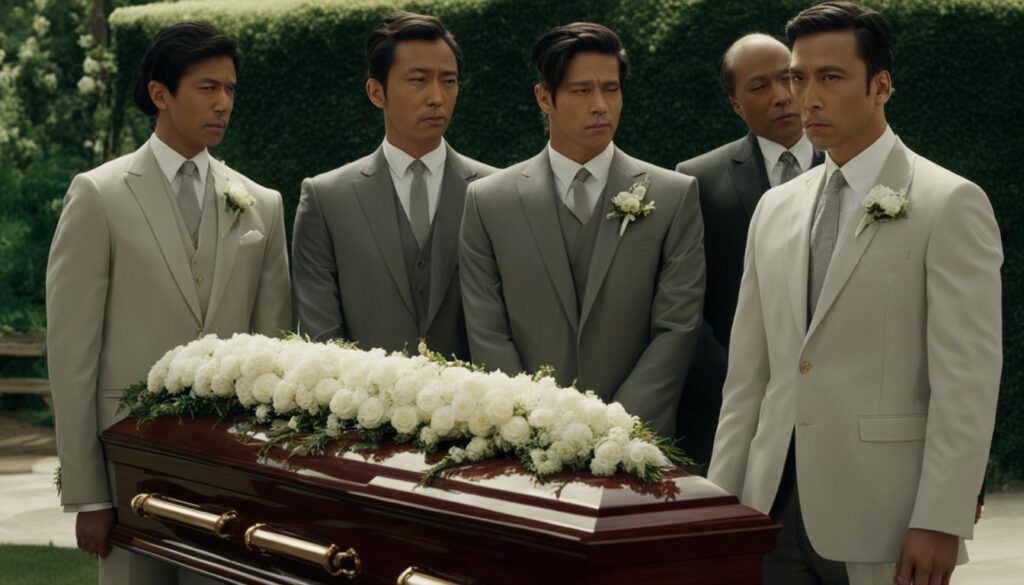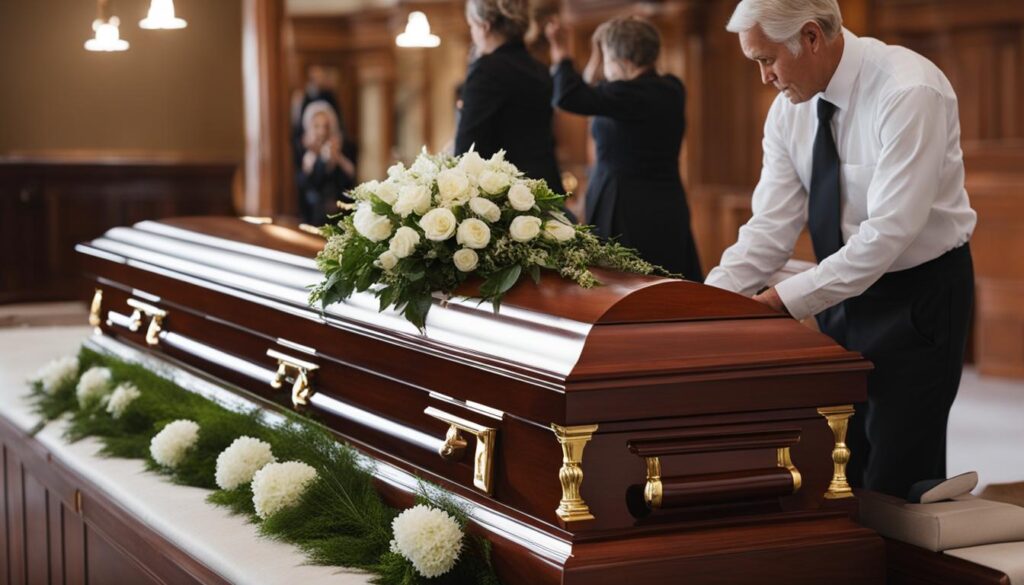We may earn money or products from the companies mentioned in this post.
Funerals are an emotional and difficult time for everyone involved. One important aspect of the ceremony is choosing the right individuals to bear the casket – the pallbearers. The responsibility of a pallbearer is not to be taken lightly. They provide a crucial role in honoring the deceased and supporting the grieving family. In this guide, we will provide valuable information on pallbearer selection and guidance, including how to choose the right individuals for this important task.
Key Takeaways
- Pallbearers play a significant role in a funeral service.
- Choosing the right individuals as pallbearers is crucial.
- There are important considerations to keep in mind when selecting pallbearers.
- Proper etiquette and behavior are expected of pallbearers during the funeral.
- Pallbearers may need support and assistance during the ceremony.
The Significance of Pallbearers in a Funeral Service
Funeral planning can be an emotionally taxing process, and selecting pallbearers is one of the many important decisions that must be made. Pallbearers play a significant role in the funeral service, both in terms of their responsibilities and the support they provide to the bereaved family.
The primary responsibility of a pallbearer is to carry the casket of the deceased from the funeral home or church to the hearse, and ultimately to the final resting place. While this may seem like a simple task, it requires physical strength and emotional fortitude. Pallbearers must remain composed and dignified throughout the ceremony, setting the tone for the solemn occasion.
Beyond their logistical responsibilities, pallbearers also provide emotional support to the family and friends of the deceased. Their presence and participation in the ceremony can be a source of comfort for those who are grieving. Pallbearers are often close friends or family members of the deceased, and their involvement in the funeral can help to honor the life of the person who has passed away.
When selecting pallbearers, it is important to choose individuals who are capable of fulfilling the responsibilities of the role. This may include individuals who are physically strong and able to carry the weight of the casket, as well as those who are emotionally stable and able to remain composed during the ceremony. Family members or friends who are unable to fulfill these responsibilities may still play an important role in the funeral service as ushers or readers.
Overall, the significance of pallbearers in a funeral service cannot be overstated. They play an important role in the ceremony and provide crucial support to the bereaved family. By carefully selecting individuals who are capable of fulfilling the responsibilities of the role, you can ensure a meaningful and dignified farewell for your loved one.
Selecting Pallbearers: Tips and Considerations
Choosing pallbearers can be a challenging task when organizing a funeral service. You want to ensure that you choose individuals who are emotionally and physically capable of fulfilling the role of a pallbearer. Here are some tips and considerations to keep in mind:
- Consider the relationship: When selecting pallbearers, consider the relationship between the deceased and the potential pallbearer. Close family members and dear friends are often the traditional choices. It is essential to check with the family of the deceased before making any final decisions.
- Physical ability: Pallbearers have to carry the casket, which can be physically demanding. Ensure that the individuals you choose are healthy and capable of carrying the casket’s weight. If the casket is exceptionally heavy, consider adding more pallbearers.
- Reliability: Pallbearers are an essential part of the funeral service, and reliability is critical. Ensure that the pallbearers you choose are reliable and punctual. You don’t want to have to replace a pallbearer at the last minute.
- Willingness: It is crucial to ask individuals if they are willing to be pallbearers. Being a pallbearer can be an emotional task, and some individuals may not feel comfortable fulfilling the role. Respect their decision if they decline.
- Follow cultural and religious guidelines: Some cultures and religions have specific guidelines for pallbearers. Ensure that you are aware of any specific pallbearer guidelines that may apply and follow them when selecting individuals.
- Offer support: Communicate with the pallbearers you have chosen to explain the role they are to play in the funeral service. Offer support and guidance throughout the process to make it easier for them.
By keeping these tips and considerations in mind, you can choose the right individuals for this important role and ensure a dignified and respectful funeral service.
Pallbearer Etiquette and Responsibilities
As pallbearers, you have been chosen to fulfill an important role in the funeral service. It is crucial to understand the etiquette and responsibilities that come with this honor. Your behavior and conduct during the service will have a lasting impact on the memory of the deceased, their family, and friends.
Arriving on Time
One of the most important responsibilities of the pallbearers is to arrive on time. This shows respect for the deceased and their family, as well as the funeral service. Plan to arrive early to allow time for any necessary preparation and to meet with the funeral director or coordinator.
Dressing Appropriately
Pallbearers should dress appropriately for the occasion. This typically involves wearing a dark suit, black tie, and black shoes. However, it is always best to confirm the dress code with the funeral director or family beforehand.
Handling the Casket
One of the primary responsibilities of the pallbearers is to handle the casket. It is important to do this with care and respect, ensuring that the casket is carried level and stable. The funeral director or coordinator will provide guidance on how to properly lift and carry the casket.
Following the Procession
During the procession, the pallbearers usually lead the way, walking in a slow and dignified manner. It is important to maintain a respectful demeanor and refrain from talking or laughing. This is a solemn occasion, and the pallbearers should behave accordingly.
“The pallbearers have a crucial role in the funeral service. Their behavior and conduct during the service will have a lasting impact on the memory of the deceased, their family, and friends.”
Providing Emotional Support
Along with their physical responsibilities, pallbearers play an important role in providing emotional support to the bereaved family. This can involve offering a comforting word or gesture, such as a hand on the shoulder, during the service. It is important to be aware of the family’s needs and to act accordingly.
Being Respectful
Throughout the service, it is important for the pallbearers to be respectful and attentive. This may involve standing when appropriate, such as during prayers or when the casket is being moved. It is also important to refrain from using phones or other electronic devices during the service.
Showing Appreciation
After the funeral service, it is appropriate to show appreciation to the pallbearers for their participation. This can involve a simple thank you or a small token of appreciation, such as a flower or card. These gestures can go a long way in acknowledging the important role that the pallbearers played in the service.
Supporting the Pallbearers
The role of a pallbearer can be emotionally and physically demanding. It is important to remember that they are providing a significant service to the bereaved family and deserve support throughout the process.
Express Gratitude
Showing appreciation for the pallbearers’ participation can go a long way in providing support. Consider writing a personal note or thank-you card to express gratitude for their contribution to the funeral service.
Offer Assistance
Pallbearers may require assistance with physical tasks such as carrying the casket or providing support to family members during the ceremony. Ensure that they have access to any necessary resources such as wheelchairs, ramps, or additional personnel to assist with the carrying of the casket.
Provide Emotional Support
Emotional support is equally important in ensuring the well-being of the pallbearers. Encourage family and friends to check in with them periodically throughout the day and offer words of encouragement or gratitude for their service.
Ensure Their Comfort
Ensure the pallbearers are comfortable by providing them with necessary accommodations such as comfortable shoes, appropriate attire, and refreshments. If the funeral ceremony is held outdoors, ensure that shade and water are available.
Conclusion
When it comes to arranging a funeral service, selecting pallbearers is an important responsibility that should not be taken lightly. Understanding their roles and responsibilities is crucial to ensuring a meaningful and respectful ceremony.
By following the tips and considerations outlined in this guide, you can choose individuals who are emotionally and physically capable of fulfilling the role of a pallbearer. This will help create a smooth and dignified funeral service.
It is important to remember that being a pallbearer can be emotionally and physically demanding. It is essential to provide support and appreciation to the pallbearers during and after the ceremony. This can help reduce their burden and make the experience less stressful.
We hope this guide has provided helpful insights and guidance on pallbearer selection and guidance. By following these guidelines, you can ensure a meaningful and respectful farewell to your loved one.
Thank you for reading.
FAQ
What is the role of pallbearers in a funeral service?
Pallbearers have the important responsibility of carrying the casket during a funeral service. They symbolize support and respect for the deceased and their grieving family.
How are pallbearers typically selected?
Pallbearers are usually chosen by the immediate family of the deceased. They may select close friends, family members, or individuals who had a significant relationship with the deceased.
Are there any specific qualifications for being a pallbearer?
There are no specific qualifications for being a pallbearer. However, it is important to choose individuals who are physically capable of carrying the weight of the casket and emotionally prepared for the responsibilities involved.
How many pallbearers are typically needed?
The number of pallbearers required can vary depending on the size and weight of the casket. Generally, six to eight pallbearers are chosen, with three on each side of the casket.
How should pallbearers dress for a funeral service?
Pallbearers are expected to dress in a respectful and formal manner. It is common for them to wear dark suits or attire that matches the dress code specified by the family.
What are the responsibilities of pallbearers during the funeral service?
Pallbearers are responsible for carrying the casket from the hearse to the designated area within the funeral venue. They may also be asked to help with any necessary movements of the casket during the service.
What should pallbearers consider in terms of etiquette during the funeral?
Pallbearers should maintain a respectful and solemn demeanor throughout the funeral service. They should follow any instructions given by the funeral director or clergy and offer support to the bereaved family.
How can family and friends support the pallbearers?
Family and friends can provide emotional support to the pallbearers by expressing gratitude for their participation and acknowledging the physical and emotional strain they may experience. Offering assistance with logistics or providing a supportive presence can also be helpful.
Affiliate Disclosure: This post may contain affiliate links. If you purchase through our link, we may receive a small commission, but at no additional cost to you. For more information, please see our Disclosure statement.



